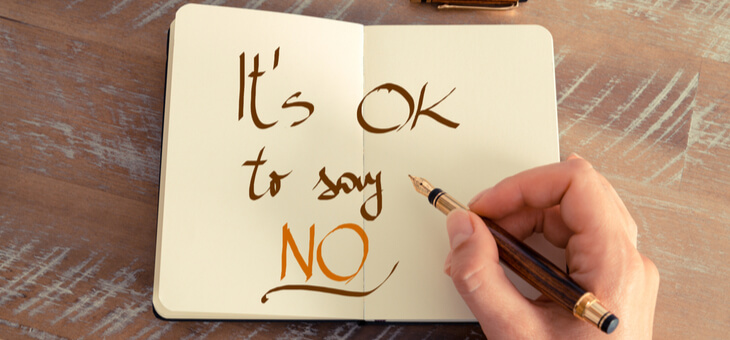‘No’ might seem like the simplest word in the world – after all, it’s only one syllable and two letters.
However, this little word has a lot of weight behind it – and sometimes it can feel impossible to say no, whether you’re in a professional or a personal situation.
Psychotherapist Somia Zaman has worked with plenty of people who find it hard to say no, and recognises where many of these difficulties might stem from. So, what’s Ms Zaman’s advice for how to push through?
Why do some people find it hard to say no?
“From my own experience of working with people who have struggled with saying no or putting boundaries in place for themselves, a lot of the time, they can have underlying self-esteem issues,” Ms Zaman suggests. “So saying no might be linked to something a bit deeper within a person – usually negative beliefs around what might be the consequences of them saying no, and the repercussions of what that means to other people.”
She suggests a lot of these people are perfectionists, who fear letting people down or being seen as doing something wrong.
Read: Signs it’s time to step away from a family drama
What are the potential impacts of this?
Being unable to say no “affects people in a lot of different ways”, explains Ms Zaman.
In the workplace, she says: “People feel a lot of pressure put on them to do things that maybe they don’t feel confident doing. They maybe feel like they need a bit more support, but they feel like they can’t speak out.”
Perhaps they have a fear that if they “express how they feel, there’s going to be disastrous consequences – they might lose their job, or be ostracised at work or something like that”.
Similar worries might creep into your personal life – that your actions will “cause some kind of disruption in that relationship, it might cause awkwardness, my partner might not ask me for anything again”, says Ms Zaman. Anxieties around “the relationship surviving” are also quite common.
However, suffering in silence “can affect your mood, your anxiety levels, and eventually it might even affect how productive you are at work”, she adds.
Read: The upside of losing an argument
Has the pandemic made things worse?
“Definitely,” says Ms Zaman. “I’ve noticed the difference between pre-COVID and during COVID in how clients are coping.
When it comes to work: “Boundaries being blurred is a very common thing people are struggling with. It’s easy to carry on working until quite late, because [people] are not having to travel, or they’re not having to leave the office. I think people are finding it more difficult during COVID to say no and put those boundaries in place.”
There might also be increased pressure to say yes to everything once the world opens up – you might feel like you’re being a let-down or party-pooper by not agreeing to every social plan.
How can you get better at saying no?
“There’s not an overnight cure, unfortunately,” says Ms Zaman. “If I had one, I’d give it to everybody.” For the psychotherapist, the key to getting more comfortable with saying no is practice.
Ms Zaman’s main tip is to “think about what your worst fear is around saying no”, in order to truly understand your anxieties around it.
“One of the ways in which people can do that is by keeping a diary or a log of situations where they’ve [wanted to say] no in the past, and being a bit self-reflective. Maybe thinking, why did I feel like I wanted to say no in that situation? What did I find difficult? What did I think would happen if I said no?”
Once you’ve figured out your anxieties around saying no, “that’s when you can work on things”, Ms Zaman suggests. You can challenge those fears – if you did say no in that situation, what would really happen? Would you lose your job, or would your friend really never talk to you again? Then, you can “look at alternative explanations”, Ms Zaman says, “you can be a bit more rational or realistic with those fears”.
Read: How much privacy is healthy in a relationship?
Whether you struggle with saying no or not, Ms Zaman advocates spending a bit more time thinking about our actions and decisions. “For some of my clients, I say at the end of the day, spend five minutes self-reflecting on your day. What things went right that day, what things didn’t go right? What were the reasons for that? What could you do to maybe change that in the future?
“So getting into a habit and practising doing that self-reflection on a daily basis, or a weekly basis if daily is too much. I think that can help people really slow down and think about why they do things.”
Do you find it hard to say no? Do you have any tips on setting boundaries you can share in the comments section below?
– With PA
If you enjoy our content, don’t keep it to yourself. Share our free eNews with your friends and encourage them to sign up.

